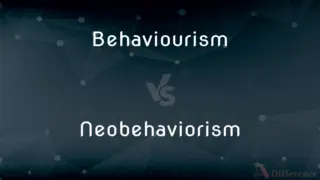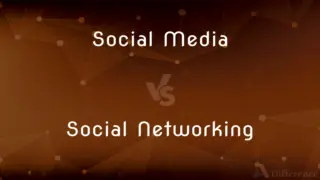Legacy vs. History — What's the Difference?
Edited by Tayyaba Rehman — By Fiza Rafique — Updated on April 18, 2024
Legacy is the influence left by individuals or events on future generations, often through intangible means; history is the study and record of past events.

Difference Between Legacy and History
Table of Contents
ADVERTISEMENT
Key Differences
Legacy typically refers to the impact or contributions that individuals, groups, or events leave behind for future generations, focusing on the effects and enduring influences. On the other hand, history is concerned with the documentation, analysis, and interpretation of past events, emphasizing a chronological record and analysis.
While legacy often involves a subjective interpretation of past actions' significance on the present and future, history relies on evidence, artifacts, and historical methods to provide an objective account of what happened. Whereas legacy is more about the qualitative aspects, history provides a quantitative and investigative perspective.
Legacy is generally discussed in terms of personal or cultural influence, such as the legacy of a political leader or an artistic movement. In contrast, history might examine the same figures or movements but focuses on their actions and impacts within a broader context of time and place.
While legacies can be intentionally shaped by individuals or institutions aiming to leave a mark on the world, the course of history is often shaped by a multitude of factors beyond individual control, including environmental, economic, and social dynamics.
Comparison Chart
Definition
Influence or contributions left for the future
Study and record of past events
ADVERTISEMENT
Focus
Impact and enduring influence
Chronological record and analysis
Nature
Subjective and qualitative
Objective and quantitative
Examples
Legacy of Martin Luther King Jr., family legacies
World wars, the Renaissance, historical texts
Influence on Society
Inspirational and aspirational
Educational and informative
Compare with Definitions
Legacy
Enduring achievements or contributions.
His scientific research has become a part of his professional legacy.
History
The study of past events.
She has a degree in European history.
Legacy
The long-term effects of events or actions.
The legacy of the industrial revolution is evident in today’s environmental challenges.
History
A chronological account of significant events often including an explanation of their causes.
The book provides a detailed history of the civil rights movement.
Legacy
An inheritance or bequest left in a will.
She received a substantial monetary legacy from her grandmother.
History
The past considered as a whole.
The leaders hoped to right the wrongs of history.
Legacy
A lasting influence on a society or culture.
The Beatles left a lasting legacy on music and popular culture.
History
A record of past events associated with a person, place, or thing.
The history of the castle dates back over five centuries.
Legacy
Something handed down from a predecessor.
The new president inherited a legacy of economic reform.
History
History (from Greek ἱστορία, historia, meaning "inquiry; knowledge acquired by investigation") is the study of the past. Events before the invention of writing systems are considered prehistory.
Legacy
An amount of money or property left to someone in a will
My grandmother died and unexpectedly left me a small legacy
History
A chronological record of events, as of the life or development of a people or institution, often including an explanation of or commentary on those events
A history of the Vikings.
Legacy
An applicant to a particular college or university who is regarded preferentially because a parent or other relative attended the same institution
Being a legacy increased a student's chance of being accepted to a highly selective college by up to 45 per cent
History
A formal written account of related natural phenomena
A history of volcanoes.
Legacy
Denoting or relating to software or hardware that has been superseded but is difficult to replace because of its wide use.
History
A record of a patient's general medical background
Took the patient's history.
Legacy
Money or property given to another by will.
History
An established condition or pattern of behavior
An inmate with a history of mental illness and drug abuse.
Legacy
Something handed down from an ancestor or a predecessor or from the past
A legacy of religious freedom.
History
The branch of knowledge that records and analyzes past events
"History has a long-range perspective" (Elizabeth Gurley Flynn).
Legacy
An individual who is either an applicant to an educational institution or a matriculated student and is the child of an alumna or alumnus.
History
The past events relating to a particular thing
The history of their rivalry is full of intrigue.
Legacy
Retained under an obsolescent or discarded system, chiefly for purposes of reference
Legacy files in the old email system.
History
The aggregate of past events or human affairs
Basic tools used throughout history.
Legacy
(legal) Money or property bequeathed to someone in a will.
History
An interesting past
A house with history.
Legacy
Something inherited from a predecessor or the past.
John Muir left as his legacy an enduring spirit of respect for the environment.
History
Something that belongs to the past
Their troubles are history now.
Legacy
(education) The descendant of an alumnus.
Because she was a legacy, her mother's sorority rushed her.
History
(Slang) One that is no longer worth consideration
Why should we worry about him? He's history!.
Legacy
Left over from the past; no longer current.
History
A drama based on historical events
The histories of Shakespeare.
Legacy
A gift of property by will, esp. of money or personal property; a bequest. Also Fig.; as, a legacy of dishonor or disease.
History
The aggregate of past events.
History repeats itself if we don’t learn from its mistakes.
Legacy
A business with which one is intrusted by another; a commission; - obsolete, except in the phrases last legacy, dying legacy, and the like.
My legacy and message wherefore I am sent into the world.
He came and told his legacy.
History
The branch of knowledge that studies the past; the assessment of notable events.
He teaches history at the university.
History will not look kindly on these tyrants.
He dreams of an invention that will make history.
Legacy
(law) a gift of personal property by will
History
The portion of the past that is known and recorded by this field of study, as opposed to all earlier and unknown times that preceded it (prehistory).
In all of human history and prehistory
In all recorded history
History
(countable) A set of events involving an entity.
What is your medical history?
The family's history includes events best forgotten.
A long and sordid history
History
(countable) A record or narrative description of past events.
I really enjoyed Shakespeare's tragedies more than his histories.
A short history of post-Columbian colonization
History
A list of past and continuing medical conditions of an individual or family.
A personal medical history is required for the insurance policy.
He has a history of cancer in his family.
This diagnosis is usually based solely on the history and physical examination, although laboratory tests are occasionally also obtained.
History
A record of previous user events, especially of visited web pages in a browser.
I visited a great site yesterday but forgot the URL. Luckily, I didn't clear my history.
History
(informal) Something that no longer exists or is no longer relevant.
I told him that if he doesn't get his act together, he's history.
History
(uncountable) Shared experience or interaction.
There is too much history between them for them to split up now.
He has had a lot of history with the police.
History
(obsolete) To narrate or record.
History
A learning or knowing by inquiry; the knowledge of facts and events, so obtained; hence, a formal statement of such information; a narrative; a description; a written record; as, the history of a patient's case; the history of a legislative bill.
History
A systematic, written account of events, particularly of those affecting a nation, institution, science, or art, and usually connected with a philosophical explanation of their causes; a true story, as distinguished from a romance; - distinguished also from annals, which relate simply the facts and events of each year, in strict chronological order; from biography, which is the record of an individual's life; and from memoir, which is history composed from personal experience, observation, and memory.
Histories are as perfect as the historian is wise, and is gifted with an eye and a soul.
For aught that I could ever read,Could ever hear by tale or history.
What histories of toil could I declare!
Justly Cæsar scorns the poet's lays;It is to history he trusts for praise.
No more yet of this;For 't is a chronicle of day by day,Not a relation for a breakfast.
Many glorious examples in the annals of our religion.
History
To narrate or record.
History
The aggregate of past events;
A critical time in the school's history
History
The continuum of events occurring in succession leading from the past to the present and even into the future;
All of human history
History
A record or narrative description of past events;
A history of France
He gave an inaccurate account of the plot to kill the president
The story of exposure to lead
History
The discipline that records and interprets past events involving human beings;
He teaches Medieval history
History takes the long view
History
All that is remembered of the past as preserved in writing; a body of knowledge;
The dawn of recorded history
From the beginning of history
Common Curiosities
How does history help us understand the past?
History provides a structured and evidential study of past events, helping us understand causes, effects, and contexts.
What is the main focus of legacy compared to history?
Legacy focuses on enduring influences and impacts, whereas history concentrates on documenting and analyzing past events.
How can someone leave a legacy?
Individuals can leave a legacy through impactful work, ethical conduct, and by influencing others positively.
Can history influence legacy?
Yes, historical events and figures often shape the legacies left for future generations.
Why is it important to study history?
Studying history is crucial for understanding societal developments, learning from past mistakes, and shaping future decisions.
Does legacy have to be intentional?
While many legacies are shaped intentionally, some form naturally over time through lasting impacts of one's actions.
Is legacy always positive?
No, legacies can be negative or positive depending on the nature of the contributions or impacts left behind.
Can an individual’s actions create both a legacy and history?
Yes, individuals like leaders and innovators often leave personal legacies and are also part of recorded history due to their significant actions.
What differentiates a historical record from a biography?
A historical record is a broad account of events and contexts, while a biography focuses more on an individual’s life and contributions.
What is historical method?
Historical method involves the techniques and guidelines by which historians use primary sources and other evidence to research and then to write history.
How are historical facts verified?
Historical facts are verified through the corroboration of multiple sources and by employing rigorous scholarly methods.
What impact does technology have on history?
Technology impacts history by altering how events unfold and are recorded, and also by changing the methods of historical research.
Can the legacy of an event change over time?
Yes, as societal values and perspectives evolve, the interpretation of past legacies can also change.
What can be considered a cultural legacy?
Cultural legacies include arts, traditions, and collective memories that influence current and future generations.
What role do artifacts play in history?
Artifacts serve as physical evidence, supporting historical research and helping to validate recorded events.
Share Your Discovery

Previous Comparison
Necessary vs. Need
Next Comparison
Quiet vs. QuietlyAuthor Spotlight
Written by
Fiza RafiqueFiza Rafique is a skilled content writer at AskDifference.com, where she meticulously refines and enhances written pieces. Drawing from her vast editorial expertise, Fiza ensures clarity, accuracy, and precision in every article. Passionate about language, she continually seeks to elevate the quality of content for readers worldwide.
Edited by
Tayyaba RehmanTayyaba Rehman is a distinguished writer, currently serving as a primary contributor to askdifference.com. As a researcher in semantics and etymology, Tayyaba's passion for the complexity of languages and their distinctions has found a perfect home on the platform. Tayyaba delves into the intricacies of language, distinguishing between commonly confused words and phrases, thereby providing clarity for readers worldwide.














































